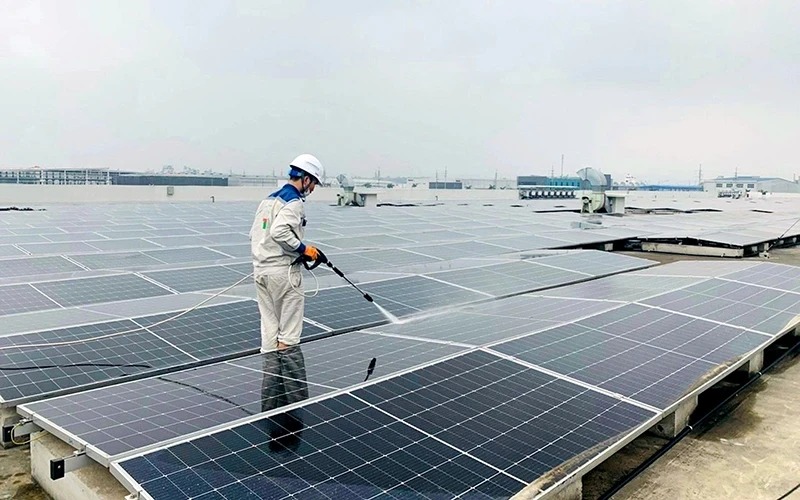Tuesday, 03/03/2026 | 20:57 GMT+7
The Party and State have issued many important policies and guidelines to promote energy transition, gradually reduce dependence on fossil energy, and increase the use of renewable energy, in which the development of science, technology and innovation is one of the solutions that is consistent throughout the implementation process.
The Law on Economical and Efficient Use of Energy in 2010 marks a turning point, orienting to increase investment and apply forms of resource mobilisation to promote scientific research and development as well as the application of advanced technology towards economical and efficient use of energy.
Along with that, the Politburo’s Resolution No.55-NQ/TW, dated February 11, 2020, also clearly states the viewpoint that economical and efficient use of energy and environmental protection are important national policies and the responsibility of the whole society.
Under the Government’s Resolution No.140/NQ-CP (dated October 2, 2020) on promulgating the Action Programme to specify the goals and solutions of Resolution No.55-NQ/TW, Decision No. 500/QD-TTg (dated May 15, 2023) on the National Power Development Plan for the period 2021-2030, with a vision to 2050, sets the goal of prioritising the strong development of renewable energy sources for electricity production.
Accordingly, the proportion of renewable energy in the supply structure will reach about 30-39% by 2030 and even 47% according to the commitment on a fair energy transition with Vietnam.

Thang Long Industrial Park (Vinh Phuc) installs environmentally friendly rooftop solar power systems.
Notably, on May 11, 2022, the Prime Minister issued Decision No. 569/QD-TTg on the Strategy for Science, Technology and Innovation Development to 2030, identifying energy technology development as one of the 10 orientations for technology development and application in the coming period, including “Researching, applying, mastering new energy technologies, renewable energy, smart energy, advanced energy storage technology, fuel cells...”
In recent times, the Ministry of Science and Technology has coordinated with many international organisations to organise programmes on energy technology, thereby disseminating the Party's guidelines and policies, the State's policies and laws and global energy transition trends; discussing policies and programs to support and promote Vietnam's energy transition in the coming period; and at the same time, providing information on new technology development trends in the energy sector in the world and recommendations on research, transfer, mastery and development of technology, especially technology solutions for renewable energy development and energy saving, thus contributing to meeting the commitments at the 26th United Nations Climate Change Conference of the Parties (COP26).
In addition, the Ministry of Science and Technology has developed, issued and organised the implementation of national programs and projects focusing on the application, transfer and innovation of technology to improve energy efficiency and minimise environmental impacts, such as: the Programme for Research, Application and Development of Energy Technology (KC05); the National Technology Innovation Programme to 2030; a project titled “Promoting the transfer, mastery and development of technology from abroad to Vietnam in priority sectors and fields in the period up to 2025, with a vision to 2030”, and many other tasks.
These efforts are not only aimed at ensuring energy security but also contribute significantly to environmental protection and rapid and sustainable socio-economic development. In the context of the global shift to clean, green and sustainable energy sources, Vietnam is gradually affirming its position and responsibility in developing green energy, aiming at the goal of green growth and sustainable development.
Many experts said that the proportion of renewable energy in the electricity sector is currently relatively limited. The reasons for these limitations come from a number of main barriers, such as: the potential for renewable energy development and energy efficiency has not been optimally exploited due to policies, finance and professional capacity; the grid connection capacity of energy projects and the stability of the power transmission system need to be improved; and investment costs are higher than average due to high technology and service prices.
In addition, although technology is a central factor in energy transition, the level of technology in some areas of the energy sector is slow to improve, the localisation and market support from projects in the energy sector for domestically produced mechanical products are still limited.
According to Deputy Director of the Department of Technology Appraisal and Assessment under the Ministry of Science and Technology Nguyen Si Dang, it is necessary to prioritise support for projects researching and developing renewable energy technology; promote technology transfer, and localise the production of equipment for the renewable energy industry in Vietnam, especially regarding wind power, solar power, hydropower, and liquefied gas.
Furthermore, it is necessary to consider developing nuclear power as a measure in energy transition; promote research and application of clean and efficient energy technologies including energy storage technology and smart grid; apply tax policies, subsidies and other incentive mechanisms to promote the use of renewable energy and other forms of clean energy; promote international cooperation to share knowledge, technology and experience in the field of renewable energy; and encourage and support start-ups in the field of renewable energy.
According to experts, there are four core factors for a successful energy transition: technology, competitive economy, market opening, and science and technology support policies.
Emphasising the issue of technology, Deputy Director of the Department of Technology Development and Innovation Nguyen Duc Hoang said that innovation is the driving force of energy transition. He noted that Innovation takes place continuously alongside the development of core technology. Therefore, it is necessary to promote technological innovation in enterprises, especially in the energy sector.
According to Nhandan.vn







